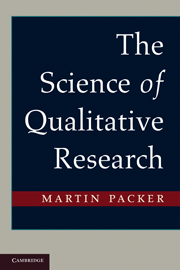Book contents
- Frontmatter
- Contents
- List of Figures and Tables
- List of Boxes
- Acknowledgments
- Introduction
- Part I The Objective Study Of Subjectivity
- Part II Ethnographic Fieldwork – The Focus On Constitution
- 6 Calls for Interpretive Social Science
- 7 Dualism and Constitution
- 8 Constitution as Ontological
- 9 The Crisis in Ethnography
- 10 Studying Ontological Work
- Part III Inquiry With An Emancipatory Interest
- References
- Name Index
- Subject Index
8 - Constitution as Ontological
- Frontmatter
- Contents
- List of Figures and Tables
- List of Boxes
- Acknowledgments
- Introduction
- Part I The Objective Study Of Subjectivity
- Part II Ethnographic Fieldwork – The Focus On Constitution
- 6 Calls for Interpretive Social Science
- 7 Dualism and Constitution
- 8 Constitution as Ontological
- 9 The Crisis in Ethnography
- 10 Studying Ontological Work
- Part III Inquiry With An Emancipatory Interest
- References
- Name Index
- Subject Index
Summary
Consider that immortal ordinary society evidently, just in any actual case, is easily done and easily recognized with uniquely adequate competence, vulgar competence, by one and all – and, for all that, by one and all it is intractably hard to describe procedurally. Procedurally described, just in any actual case, it is elusive.
Garfinkel, 1996, p. 8In this chapter, I want to change your ontology! We saw in the last chapter how Husserl, Schutz, and Berger and Luckmann tried to study the kind of constitution that Kant had identified, in which individual perception and reason together form representations of an external reality. We discovered how their ontological dualism prevented them from doing more than study the experience of “reality” while, paradoxically, trying to bracket all claims about what actually is real. This chapter follows a different path, one that explores the conditions for the capacity to form subjective representations. I begin with Georg Hegel’s response to Kant, then continue with Martin Heidegger, Maurice Merleau-Ponty, and finally Harold Garfinkel. Their work amounts to a different kind of phenomenology, one that explores a nondualist ontology, a “radical realism.” Here constitution is viewed not as a matter of forming concepts or representations but as the forming of objects and subjects, an ontological rather than epistemological process. The focus shifts from conceptual knowledge, studied with a detached, theoretical attitude, to practical, embodied know-how, studied in an involved way. Know-how provides a way to see the world. By the end of the chapter, I hope to have convinced you to see people and objects as inextricably one with their forms of life, and to see reason and thinking as cultural, historical, and grounded in practical know-how.
The analyses in the last chapter started from the assumption that we are naturally creatures with minds, inner spaces in which representations are formed, and asked how these representations are structured and under what circumstances they are valid.
- Type
- Chapter
- Information
- The Science of Qualitative Research , pp. 167 - 207Publisher: Cambridge University PressPrint publication year: 2010



